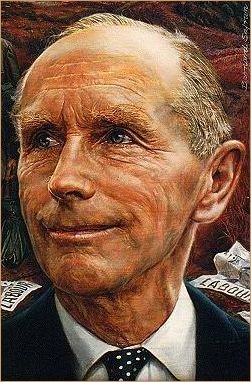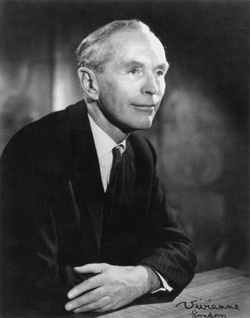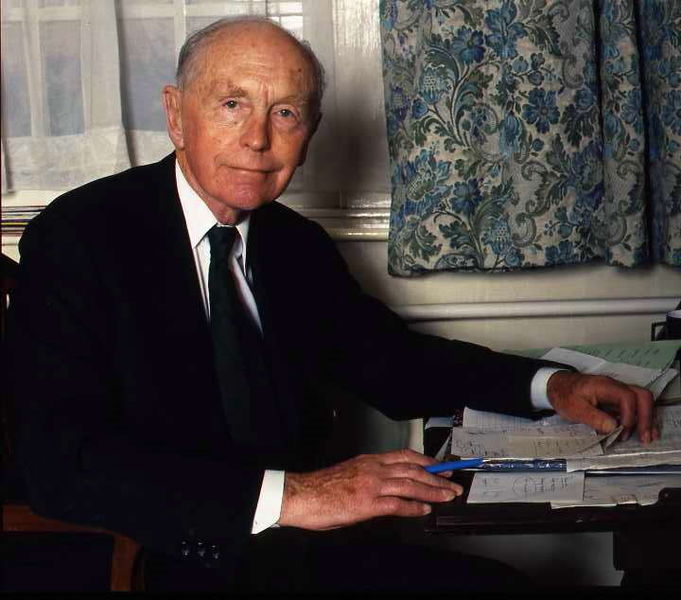<Back to Index>
- Geologist Marcel Alexandre Bertrand, 1847
- Composer Johann Staden, 1581
- Prime Minister of the United Kingdom Alexander Frederick Douglas-Home, 1903
PAGE SPONSOR


Alexander Frederick Douglas-Home, Baron Home of the Hirsel, KT, PC (2 July 1903 – 9 October 1995), known as The Earl of Home from 1951 to 1963 and as Sir Alec Douglas-Home from 1963 to 1974, was a British Conservative politician who served as Prime Minister of the United Kingdom from October 1963 to October 1964. He is the last member of the House of Lords to be appointed Prime Minister and to become Prime Minister, he had to disclaim his peerage and contest a by-election to enter the House of Commons. He is also the only Prime Minister to have played first class cricket.
Douglas-Home was born in Mayfair, Westminster, England, the eldest of seven children born to Charles, Lord Dunglass, (the oldest son of the 12th Earl of Home) and Lady Lilian Lambton, daughter of Frederick Lambton, 4th Earl of Durham. His mother was the great-great-granddaughter of the reforming Prime Minister Charles Grey, 2nd Earl Grey. After his father's succession to the Earldom in 1918 he held the courtesy title Lord Dunglass. One of his brothers was the dramatist William Douglas - Home.
Douglas-Home was educated at Ludgrove School, followed by Eton College and Christ Church at the University of Oxford, where he graduated with a Third Class Honours MA in Modern History in 1925. He was President of Vincent's Club in 1926. At Eton, his contemporaries included Cyril Connolly, who later described him as "a votary of the esoteric Eton religion, the kind of graceful, tolerant, sleepy boy who is showered with all the laurels, who is liked by the masters and admired by the boys without any apparent exertion on his part". Connolly famously concluded, "in the eighteenth century he would have become Prime Minister before he was 30: as it was he appeared honourably ineligible for the struggle of life".
In 1936 Douglas-Home married Elizabeth Alington, the daughter of Cyril Alington, who had been Douglas-Home's headmaster at Eton. They had four children: Caroline, Meriel, Diana and David.
Douglas-Home was a talented cricketer at school, club and county level, and is the only British prime minister to have played first - class cricket. Amongst other clubs, he represented the MCC, Middlesex CCC and Oxford University Cricket Club at first - class level, playing under the name "Lord Dunglass", his title at the time. Three of his first-class games were internationals against Argentina on the MCC 'representative' tour of South America in 1926 – 27.
After
Douglas-Home had retired as prime minister, he became president of the
MCC in 1966. Between 1977 and 1989 he was Governor of I Zingari, the well known nomadic cricket team. Douglas-Home became the Scottish Unionist Party Member of Parliament (MP) for Lanark in 1931. His high birth gave him a head start in Parliament and he served as Parliamentary Private Secretary to Neville Chamberlain from 1937 to 1939, witnessing first hand the latter's attempts to stave off World War II through negotiation with Adolf Hitler. Douglas - Home fell gravely ill with spinal tuberculosis in 1938, which kept him immobile on his back for two years and prevented him from taking an active part in World War II. Home lost his parliamentary seat in the Conservatives' landslide defeat in the 1945 general election,
but regained it in 1950. However, he was automatically disqualified
from the Commons in 1951 when he inherited his father's seat in the
House of Lords, becoming the 14th Earl of Home. Lord Home, as he then was, served not only as Commonwealth Secretary from 1955 during the time of the Suez Crisis but, from 1957, also as Leader of the House of Lords and Lord President of the Council (the latter twice; briefly in 1957 and subsequently from 1959). Home traded all three for the Foreign Office in 1960. In 1962, he was created a knight of the Order of the Thistle,
the highest Scottish honour and in the personal gift of the Monarch,
which entitled him to be styled "Sir" after later disclaiming his
earldom. On 18 October 1963, Conservative Prime Minister Harold Macmillan suddenly resigned following prostate trouble
from which he feared he would not recover. At the time, the
Conservative Party had no formal procedure for selecting a leader,
merely a series of informal soundings among MPs and senior party
figures. Queen Elizabeth II was expected to choose a new Prime Minister on the basis of advice given her by the party's elder statesmen. Douglas-Home
did not originally seek the office of Prime Minister, being apparently
quite content to serve in the House of Lords and hold the office of
Foreign Secretary. However, Home was put forth by Macmillan as a
compromise candidate and was persuaded to enter the race. Though Rab Butler,
effectively the "Deputy Prime Minister" (officially no such
constitutional office then existed, with the title on its rare usages
being an honorary one), was the favourite among Conservative MPs, Home
was preferred by the elder statesmen, some of whom indicated that they
would refuse to serve in Cabinet under Butler or the other potential
candidate, Quintin Hogg. Macmillan was apparently determined not to allow Butler to succeed him. Macmillan's resignation took place at the time of the 1963 Conservative Party Conference, which became something akin to an United States presidential nominating convention as
various candidates and their supporters competed publicly for the
position. Following a series of consultations to determine who could
command support from across the party and prove the best compromise
candidate, Macmillan advised Queen Elizabeth II. Although it was argued
that he had no right to advise the Queen as to whom to invite to kiss hands as
Prime Minister, and the Queen was under no obligation to accept his
advice, the Queen duly invited the Earl of Home to become Prime
Minister and First Lord of the Treasury. The Queen first invited Home to Buckingham Palace for
a meeting and granted him 24 hours to determine whether he could
successfully form an administration. Home determined that he could do
so. Douglas-Home believed it would not be practical to serve as Prime Minister from the Lords. It was widely believed that Lord Curzon had not been invited to become prime minister in 1923 because of his seat in the Lords. Using the Peerage Act 1963, which had only been passed earlier in the same year after Tony Benn's
campaign to disclaim his peerage, Home disclaimed his Earldom and other
peerages on 23 October 1963. For the next two weeks he belonged to
neither House of Parliament, a very unusual occurrence for a sitting
Prime Minister. As "Sir Alec Douglas-Home", he contested and won a by-election in the safe seat of Kinross & West Perthshire. Linked as it was to the damaged former government's Profumo Affair of 1963, Douglas-Home's tenure as prime minister lasted only one year. The October 1964 general election was won by the Labour Party under the new leadership of Harold Wilson.
However, the margin of victory proved narrow and the election thus
provided a much sterner test for Wilson than expected. Indeed it was in
this campaign that Home made his most famous remark. Wilson kept
telling Douglas - Home that he was not a man of the people, as he was
the
14th Earl of Home. Douglas - Home responded, "as far as the 14th Earl
is concerned I suppose that Mr. Wilson, when you come to think of it,
is
the 14th Mr. Wilson". Home
remained leader of the party until his resignation in July of the
following year. At this time, Douglas-Home himself revised the rules of
the Conservative Party to allow the party leader to be selected by a
series of ballots of all Conservative MPs. The resulting leadership election was won by Edward Heath, who defeated Reginald Maudling and Enoch Powell.
Over the following six years, Douglas-Home was notably loyal to Heath,
comparing those who questioned his position with impatient gardeners
who would keep digging up a tree to gauge its progress by examining its
roots.
In
1970, Heath became prime minister, Douglas-Home returned to the post of
Foreign Secretary. As of 2011, he is the last former Prime Minister to
take a Ministry in someone else's cabinet. In
1973, Douglas-Home announced his intention to retire from Parliament
and government at the next general election but was overtaken by the
calling of a snap general election in February 1974. Following the defeat of the Heath government by Harold Wilson in 1974, Douglas-Home retired from front line politics and stood down from the Commons at the October 1974 election. In the 1979 devolution referendum, Douglas-Home made a high profile statement arguing that an incoming Conservative Government would introduce a better Scottish Assembly. In actuality, Margaret Thatcher's government did not do so. From 1977 to 1980, he chaired the Bilderberg Group meetings, replacing Prince Bernhard.
Douglas-Home was restored to the House of Lords when he accepted a life peerage, becoming known as Baron Home of the Hirsel, of Coldstream in the County of Berwick. The Hirsel was his family seat in Berwickshire, and he continued to appear in the House of Lords into his nineties. As of 2009, Douglas-Home ranks as the third longest lived British Prime Minister, behind James Callaghan and Harold Macmillan. His autobiography, The Way The Wind Blows, was published in 1976. He was also the author of Peaceful Change (1964) and Border Reflections (1979). His correspondence with his grandson Matthew Darby was published as Letters to a Grandson in 1983. He died on 9 October 1995 at his home, The Hirsel, in Berwickshire. He was 92 years old. He was buried shortly afterwards at nearby Coldstream. He was succeeded as Earl of Home by his only son, David Douglas-Home. He also had three daughters, Lady Caroline Douglas - Home DL, Lady Meriel Darby (who married Adrian Darby OBE) and Lady Diana Wolfe Murray (who married James Wolfe Murray). A plot to kidnap Home in April 1964 was foiled by the Prime Minister himself. Two left wing students from the University of Aberdeen planned
to kidnap him. Home met the two students in public and gave them
£1 for a charity in return for not kidnapping him, which he took
as a joke. The students followed his car, intending to force it to
crash or block it, and then kidnap the Prime Minister. However, they
lost their nerve and instead went to the house of John and Priscilla Buchan,
where Home was staying. He was alone at the time and answered the door,
where the students told him that they planned to kidnap him. Home
responded, "I suppose you realise if you do, the Conservatives will win
the election by 200 or 300." After packing several things, he offered
the kidnappers some beer, which they accepted. Home eventually
convinced them to abandon their plot. Home
never publicly spoke of the kidnapping because he did not want to ruin
the career of his bodyguard but told the story in 1977 to the former
Lord Chancellor Quintin Hogg, who recorded it in his diaries. In July 2009, BBC Radio 4 broadcast a dramatisation of the event entitled The Night They Tried to Kidnap the Prime Minister, written by Martin Jameson and starring Tim McInnerny as Home.
Douglas-Home was constantly referred to as 'Baillie Vass' by the satirical magazine Private Eye. This running joke began in 1964 when a provincial newspaper, the Aberdeen Evening Express accidentally used a picture of Douglas-Home over a caption referring to a baillie called Vass. Private Eye then
affected to believe that Douglas-Home was an impostor whom the
newspaper had unmasked, and the magazine maintained this conceit until
his death.
